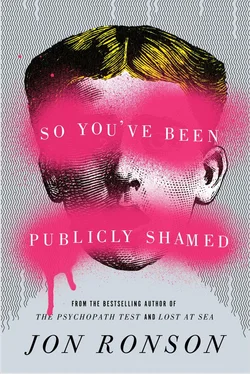“I’m forever grateful to him,” he said.
—
My trip to Washington, D.C., wasn’t turning out how I’d hoped. I’d assumed that Ted Poe would be such a terrible person and negative role model that the social media shamers would realize with horror that this was what they were becoming and vow to change their ways. But Mike Hubacek thought his shaming was the best thing that had ever happened to him. This was especially true, he told me, because the onlookers had been so nice. He’d feared abuse and ridicule. But no. “Ninety percent of the responses on the street were ‘God bless you’ and ‘Things will be okay,’” he said. Their kindness meant everything, he said. It made it all right. It set him on his path to salvation.
“Social media shamings are worse than your shamings,” I suddenly said to Ted Poe.
He looked taken aback. “They are worse,” he replied. “They’re anonymous.”
“Or even if they’re not anonymous, it’s such a pile-on they may as well be,” I said.
“They’re brutal ,” he said.
I suddenly became aware that throughout our conversation I’d been using the word they . And each time I did, it felt like I was being spineless. The fact was, they weren’t brutal. We were brutal.
—
In the early days of Twitter there were no shamings. We were Eve in the Garden of Eden. We chatted away unself-consciously. As somebody back then wrote, “Facebook is where you lie to your friends, Twitter is where you tell the truth to strangers.” Having funny and honest conversations with like-minded people I didn’t know got me through hard times that were unfolding in my actual house. Then came the Jan Moir and the LA Fitness shamings — shamings to be proud of — and I remember how exciting it felt when hitherto remote evil billionaires like Rupert Murdoch and Donald Trump created their own Twitter accounts. For the first time in history we sort of had direct access to ivory-tower oligarchs like them. We became keenly watchful for transgressions.
After a while, it wasn’t just transgressions we were keenly watchful for. It was misspeakings. Fury at the terribleness of other people had started to consume us a lot. And the rage that swirled around seemed increasingly in disproportion to whatever stupid thing some celebrity had said. It felt different to satire or journalism or criticism. It felt like punishment. In fact, it felt weird and empty when there wasn’t anyone to be furious about. The days between shamings felt like days picking at fingernails, treading water.
I’d been dismayed by the cruelty of the people who tore Jonah apart as he tried to apologize. But they weren’t the mob. We were the mob. I’d been blithely doing the same thing for a year or more. I had drifted into a new way of being. Who were the victims of my shamings? I could barely remember. I had only the vaguest recollection of the people I’d piled onto and what terrible things they’d done to deserve it.
This is partly because my memory has degenerated badly these past years. In fact, I was recently at a spa — my wife booked it for me as a special surprise, which shows she really doesn’t know me because I don’t like being touched — and as I lay on the massage table, the conversation turned to my bad memory.
“I can hardly remember anything about my childhood!” I told the masseur. “It’s all gone!”
“A lot of people who can’t remember their childhoods,” she replied, as she massaged my shoulders, “it turns out that they were sexually abused. By their parents.”
“Well, I’d remember THAT ,” I said.
But it wasn’t just the fault of my lousy memory. It was the sheer volume of transgressors I’d chastised. How could I commit to memory that many people? Well, there were the spambot men. For a second in Poe’s office I reminisced fondly on the moment someone suggested we gas the cunts. That had given me such a good feeling that it felt a shame to interrogate it — to question why it had beguiled me so.
“The justice system in the West has a lot of problems,” Poe said, “but at least there are rules. You have basic rights as the accused. You have your day in court. You don’t have any rights when you’re accused on the Internet. And the consequences are worse. It’s worldwide forever.”
It felt good to see the balance of power shift so that someone like Ted Poe was afraid of people like us. But he wouldn’t sentence people to hold a placard for something they hadn’t been convicted of. He wouldn’t sentence someone for telling a joke that came out badly. The people we were destroying were no longer just people like Jonah: public figures who had committed actual transgressions. They were private individuals who really hadn’t done anything much wrong. Ordinary humans were being forced to learn damage control, like corporations that had committed PR disasters. It was very stressful.
“We are more frightening than you ,” I said to Poe, feeling quite awed.
Poe sat back in his chair, satisfied. “You are much more frightening,” he said. “You are much more frightening.”
—
We were much more frightening than Judge Ted Poe. The powerful, crazy, cruel people I usually write about tend to be in far-off places. The powerful, crazy, cruel people were now us.
It felt like we were soldiers making war on other people’s flaws, and there had suddenly been an escalation in hostilities.
Five.Man Descends Several Rungs in the Ladder of Civilization
Group madness. Was that the explanation for our shaming frenzy, our escalating war on flaws? It’s an idea that gets invoked by social scientists whenever a crowd becomes frightening. Take the London riots of August 2011. The violence had begun with police shooting to death a Tottenham man, Mark Duggan. A protest followed, which turned into five days of rioting and looting. The rioters were in Camden Town, a mile from my house, smashing up kebab shops and JJB Sports, Dixons, and Vodafone stores. Then they were in Kentish Town, half a mile down the hill from us. We frantically locked our doors and stared in horror at the TV news. The crowd had become contaminated — according to Dr. Gary Slutkin, an epidemiologist writing in The Observer —by a virus that infects the mind and causes a “collective communal group-think-motivated violence.” (Here Slutkin was quoting the cognitive psychologist Aaron Beck.) It sounded like a zombie film. In The Guardian , Jack Levin — a professor of sociology and criminology at Northeastern University in Boston — called the riots “the violent version of the Mexican wave.” People were infected with “emotional contagion. It is a feature of every riot… People get together in a group and commit acts of violence that they would never dream of committing individually.”
Luckily, the rioting fizzled out at the bottom of our hill that night. Which, now that I thought about it, didn’t sound like the violent version of the Mexican wave at all. If the rioters had really lost their minds to a horrifying virus, you’d think they would have carried on up the hill. Our hill, Highgate West Hill, is very steep — one of the steepest in London. I think the rioters made the extremely lucid decision not to climb it.
—
It turns out that the concept of group madness was the creation of a nineteenth-century French doctor called Gustave LeBon. His idea was that humans totally lose control of their behavior in a crowd. Our free will evaporates. A contagious madness takes over, a complete lack of restraint. We can’t stop ourselves. So we riot, or we jubilantly tear down Justine Sacco.
It wasn’t easy to learn about Gustave LeBon. For being the father of such an enduring theory, almost nothing has been written about him. Only one man has ever tried to piece his life story together — Bob Nye, a professor of European intellectual history at Oregon State University.
Читать дальше












